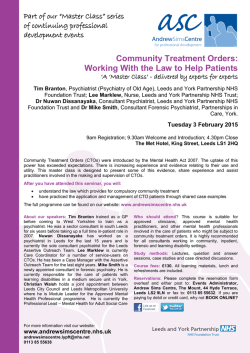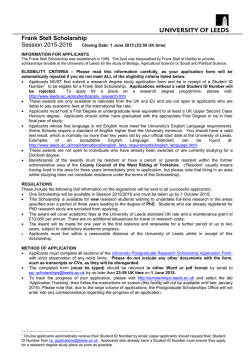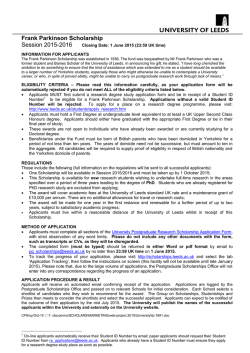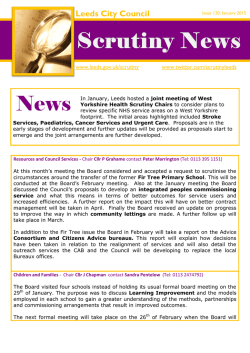
City Priority Plan - Leeds City Council
Leeds 2015 Our vision to be the best city in the UK City Priority Plan 2011 to 2015 Our ambition is to be the best city in the UK ‘The purpose of this citywide partnership plan is to improve life for the people of Leeds and make our city a better place. It brings together a number of key four-year priorities that will help us deliver our long term vision’ issues that we need to address now. This is why, alongside the long-term Vision for Leeds, we are publishing this City Priority Plan, which sets out the key outcomes and priorities to be delivered by the council, and its partners, over the next four years. After listening carefully to what local people, businesses and organisations have said, our vision is that: What do we want to achieve by 2015? By 2030, Leeds will be locally and internationally recognised as the best city in the UK. In the current environment of reduced public funding, we have to make difficult choices about where we can make progress by 2015. We have developed a set of priorities that we must do over the next four years - urgent issues that we need to address to deliver our long term ambition to be the best city in the UK. This long-term Vision is supported by three aims. • Leeds will be fair, open and welcoming. • Leeds’ economy will be prosperous and sustainable. • All Leeds’ communities will be successful. This Vision will be the driver for the city’s other strategies and action plans and for our continued partnership working over the next 20 years. However, we know that it is difficult to anticipate all the changes that will take place between now and 2030 and we also recognise that there are urgent Five separate action plans have been drawn up to deliver these priorities. These are: • Children and Young People’s City Priority Plan; • Health and Wellbeing City Priority Plan; • Housing and Regeneration City Priority Plan; • Safer and Stronger Communities City Priority Plan; and • Sustainable Economy and Culture City Priority Plan. This publication can also be made available in large print, Braille, on audio tape, audio cd and on computer disk. If you do not speak English and need help in understanding this document, please telephone the number below and state the name of your language. We will then put you on hold while we contact an interpreter. The number is 0113 224 3462. Farsi: Punjabi: Tigrinya: Urdu: Czech: Jestliže nemluvíte anglicky a potřebujete, aby vám někdo pomohl vysvětlit tento dokument, prosím zavolejte na níže uvedené číslo a uveďte svůj jazyk. Potom vás požádáme, abyste nepokládal(-a) telefon a mezitím zkontaktujeme tlumočníka. French: Si vous ne parlez pas anglais et que vous avez besoin d’aide pour comprendre ce document, veuillez téléphoner au numéro ci-dessous et indiquez votre langue. Nous vous demanderons d’attendre pendant que nous contactons un(e) interprètre. Polish: Jeżeli nie mówią Państwo po angielsku i potrzebują pomocy w zrozumieniu tego dokumentu, prosimy zadzwonić pod poniższy numer telefonu. Po podaniu nazwy swojego ojczystego języka prosimy poczekać – w tym czasie będziemy kontaktować się z tłumaczem. Measuring our progress Along with the four-year priorities, the partnership has identified a series of headline indicators. These have been chosen as the best overall measure of our progress towards the priority. In addition, we will track other indicators and measures of our progress, which will make sure we have a more detailed understanding of the factors that impact on achieving our priorities. Best city… for health and wellbeing There are a range of social, economic and environmental factors that affect people’s health in Leeds, which cause some people to have poorer health than others. In Leeds, we will focus on housing, education, transport, green space, work and poverty and what we can do to help everyone have the best chance to be healthy. Health and social care services will work together better to help people stay active and independent for as long as possible and provide care when needed in local communities. Over the next four years we will: The four-year priorities Headline indicators Help protect people from the harmful effects of tobacco. Reduce the number of adults over 18 that smoke. Support more people to live safely in their own homes. Reduce the rate of emergency admissions to hospital. Reduce the rate of admission to residential care homes. Give people choice and control over their health and social care services. Increase the proportion of people with long-term conditions feeling supported to be independent and manage their condition. Make sure that people who are the poorest improve their health the fastest. Reduce the differences in life expectancy between communities. Reduce the difference in healthy life expectancy between communities. Best city… for children and young people Leeds will be a child-friendly city where the voices, needs and priorities of children and young people are heard and inform the way we make decisions and take action. Over the next four years we will: The four-year priorities Headline indicators Help children to live in safe and supportive families. Reduce the number of children in care. Improve behaviour, attendance and achievement. Raise the level of attendance in both primary and secondary schools. Increase the levels of young people in employment, education or training. Reduce the number of 16 to 18-year-olds that are not in education, employment or training. Best city… for business Leeds has started to recover from the recession, and we need to make sure jobs are created and that local people can access those jobs. We will make sure new developments create skills and opportunities through apprenticeships. Leeds will be an attractive place to visit and invest in, with cultural attractions for local people and visitors nationally and internationally. Over the next four years we will: The four-year priorities Headline indicators Create more jobs. Increase the number of new jobs. Improve skills. Increase the number of employers offering apprenticeships. Support the sustainable growth of the Leeds’ economy. Hectares of brownfield land under redevelopment. Increase number of businesses registering for Value Added Tax (VAT). Get more people involved in the city’s cultural opportunities. Increase the proportion of adults and children who regularly participate in cultural activities. Improve journey times and the reliability of public transport. Increase the percentage of residents who can get to work by public transport within half an hour at peak times. Improve the environment through reduced carbon emissions. Reduce carbon emissions. Raise the profile of Leeds nationally and internationally. Improve our position in the European survey of best cities in which to do business. Best city… for communities Our communities will get the backing they need to help local people lead their lives successfully. We will encourage community spirit and local activity, but recognise that it will take high-quality public services working with local people to tackle crime and anti-social behaviour effectively, and to keep our neighbourhoods clean and green. Over the next four years we will: The four-year priorities Headline indicators Reduce crime levels and their impact across Leeds. Reduce the overall crime rate. Effectively tackle and reduce anti-social behaviour in our communities. Improve public perception rates that anti-social behaviour is being managed effectively. Ensure that local neighbourhoods are clean. Reduce the percentage of streets in Leeds with unacceptable levels of litter. Increase a sense of belonging that builds cohesive and harmonious communities. Increase the number of people who believe people from different backgrounds get on well together in the local area. Best city… to live Leeds needs investment in new homes and our aim is to attract maximum investment from the private sector and government. We will finalise our housing planning policy to grow the city in a sustainable way, while maintaining the distinctiveness of communities and a green city. We will improve our existing homes, making them more energy efficient and easier to heat. Over the next four years we will: The four-year priorities Headline indicators Maximise regeneration investment to increase housing choice and affordability within sustainable neighbourhoods. Increase the number of new homes built per year. Increase the number of new affordable homes built each year. Increase the number of long-term empty properties brought back into use. Enable growth of the city whilst protecting the distinctive green character of the city. Improve the percentage of people satisfied with the quality of the environment. Improve housing conditions and energy efficiency. Increase the number of properties improved with energy efficiency measures. Increase the number of properties, which achieved the decency standard. Working together to deliver our priorities We have recently revised our partnership arrangements and have set up a new Leeds Initiative Board and five strategic partnership boards, made up of organisations from the public, private and voluntary sectors, to provide a strong lead and a focus on the actions that will make a difference. These are: • Children’s Trust Board; • Sustainable Economy and Culture Board; • Safer and Stronger Communities Board; • Health and Wellbeing Board; and • Housing and Regeneration Board. The Leeds Initiative Board takes overall responsibility for managing performance across the five boards. Each priority will be progressed through an action plan and accountability for improvement in that priority will rest with the respective board. We will monitor our progress in delivering the plans and provide regular updates on our progress. The priorities and targets will be formally reviewed after two years to ensure that they still contain our ‘must do’ priorities. When we have delivered a significant improvement in one priority we will replace it with another so that we keep challenging ourselves in our ambition to be the best city in the UK. Each board will be responsible for measuring and tracking progress towards our Vision aims and taking action to tackle any problems. But this is a partnership plan and we know that it can only be delivered through the efforts of all of us working together and collectively bringing our resources to bear on the problems and the opportunities facing Leeds. We will need to work differently, to deliver more for less, and be much more focused on achieving the priorities we have identified. And it is not just these boards that will help us to become the best city in the UK. We will seek the support, energy and enthusiasm of people, organisations and businesses throughout the city to work together to make Leeds the best city in the UK. Equality Impact Assessment All public bodies have a general public duty under the Equalities Act 2010 to: • eliminate unlawful discrimination, harassment, and victimisation; • advance equality of opportunity; and • foster good relations. Due regard has been given to the strategic planning approach and City Priority Plans through the completion of an equality impact assessment. This clearly outlines the demographics of the city, references the comprehensive piece of fact finding research, which was undertaken for the Vision for Leeds Equality Impact Assessment, and the consultation process that has taken place to inform and develop both the Vision for Leeds and the City Priority Plans. It recognises that for individual equality impact assessments of the City Priority Plans and supporting action plans, there may be a need for further fact finding. Detailed information on the approach taken for each of the five City Priority Plans can be found within the Action Plans. Email us at: [email protected] Or telephone: 0113 2243462 Or write to us at: Corporate Policy and Performance Team Leeds City Council 2nd Floor East Civic Hall Leeds LS1 1UR
© Copyright 2026





